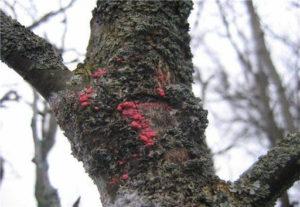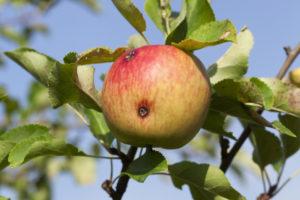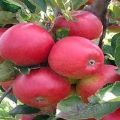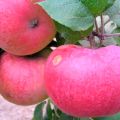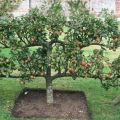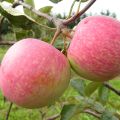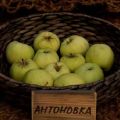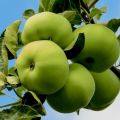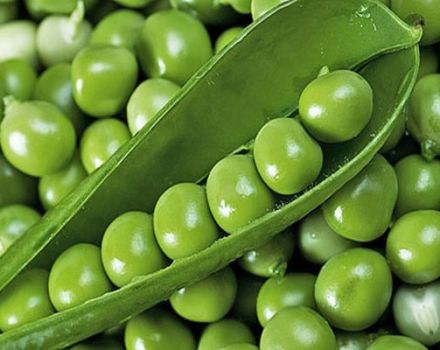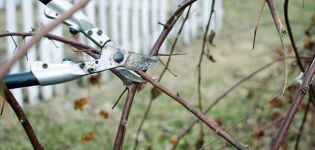Description and varieties of Bryanskoe apple trees, planting and care rules
The Bryanskoye apple tree is a frequent visitor to the orchards of central Russia. The result of the painstaking work of the Bryansk breeder was above all praise. As many as 3 species of the same variety, and each of them is good in its own way. An unpretentious, fruitful tree has long found its way to the heart of an avid gardener. It is enough to show a little attention to this plant, and it will thank the owner with an unprecedented harvest.
How the Bryanskoe variety was bred
The tree was bred by the breeder A.I. Astakhov at the All-Russian Research Institute of Lupin. The scientist was faced with the task of creating a variety of apple trees that are resistant to scab disease. Having crossed the popular variety Pobeditel with a hybrid apple tree SPO 523, the breeder achieved a positive result. The variety turned out to be prolific, and the polygenes and the Vm gene introduced into the structure of the plant strengthened the immunity of the apple tree.
Advantages and disadvantages
An unpretentious variety boasts many advantages, but in order to successfully grow a fruiting tree, it is necessary to take into account the minor flaws of the plant.
The advantages of the variety:
- The tree successfully resists many diseases.
- The apple tree is hardy, easily tolerates winter cold.
- The fruits are kept on the branches until the harvest period.
- The tree bears its first fruits already 3-4 years after planting.
- The taste of apples will delight even the most fastidious gardeners.
Disadvantages of the variety:
- As a result of a long storage period, the structure of the fruit changes - the pulp becomes friable. In this case, the taste of apples remains the same.
- With insufficient care, the fruits are affected by rot.

Varieties and characteristics of varieties
Alexander Ivanovich Astakhov created 3 varieties of the Bryansk apple tree. Each of them is attractive in its own way.
Aloe
The variety was obtained by crossing the SR 0523 hybrid and the Winner apple tree, beloved by many gardeners. Medium size and compact rounded crown give the tree a neat look. Its straightened shoots rush upward, but gradually form an obtuse angle with the trunk. Light green, large leaves are slightly curled.
An unpretentious plant is responsive to good care. Every year the apple tree bears a harvest of bright sweet and sour apples.The fruits cannot be called large, their size reaches 200 g. The juicy, crispy pulp of the fruit has a dense texture. The unique aroma, flattened shape and bright crimson color make the variety recognizable.
The crop can be harvested in September. If you follow the storage rules, scarlet apples lie until spring. Saplings should not be placed in lowlands, since at low temperatures the skeletal branches of the tree can freeze.
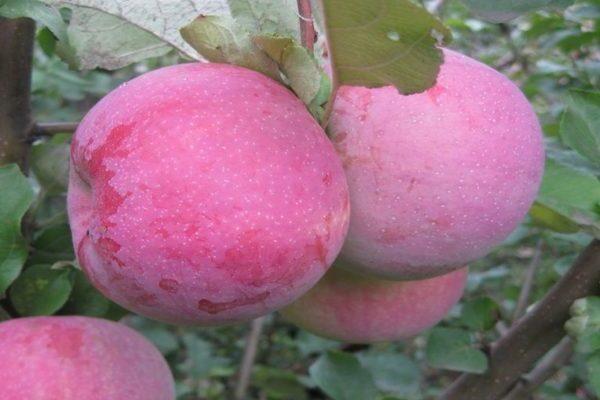
Golden
A winter dessert variety appeared as a result of crossing the legendary Antonovka with the equally famous apple tree called Golden Delhi. A hardy, fast-growing, winter-hardy variety regularly pleases its owners with a harvest, but, unlike the scarlet Bryansk apple tree, it has periodic fruiting. The first harvest can be seen already in the fifth year after planting. Medium-sized trees have a dense, lush crown. The curved branches of the apple tree form a right angle with the trunk.
Large, fragrant fruits fully confirm the name. It is impossible to look indifferently at a golden, shiny apple. Dark specks shine through from under the amber skin of the oblong fruit, and the spicy aroma evokes memories of oriental sweets. The weight of apples ranges from 180 to 250 g. If the storage rules are observed, the fruits can lie safely until May.
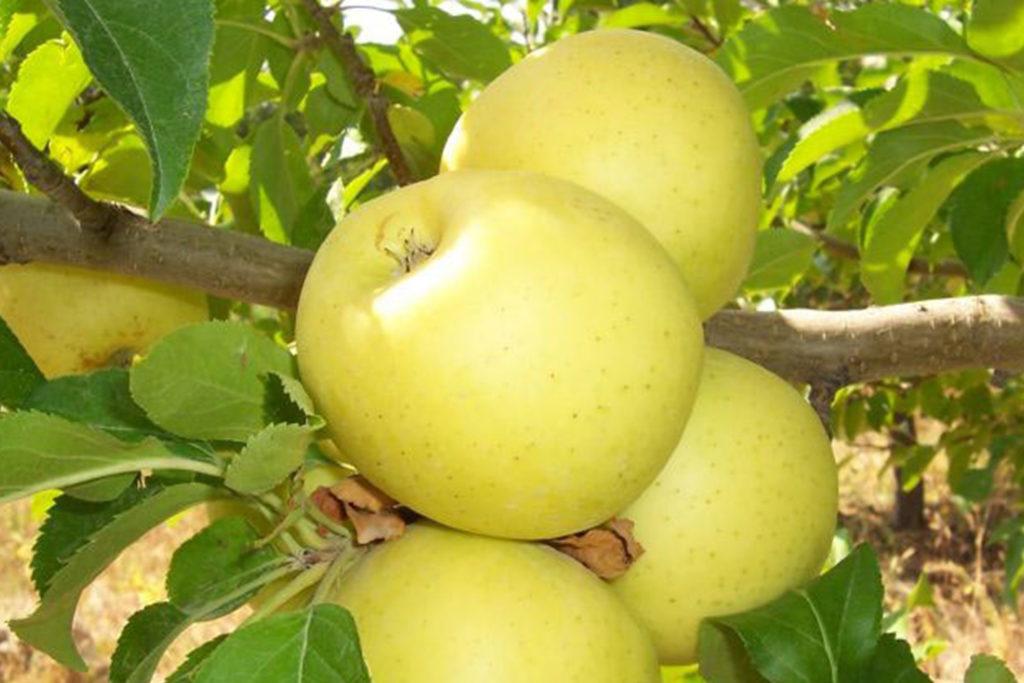
Pink
The main difference between the variety and other varieties of the Bryansk apple tree is the ability to grow and bear fruit safely in unfavorable conditions. It is a wonderful productive plant that grows quickly and does not require special maintenance. The apple tree successfully resists fungal diseases.
The compact, rounded shape of the tree looks very decorative. The harvest ripens in September. Oblong, rounded apples have a unique sweet and sour taste. The fragrant fruits are stored until December.
Description of culture
A mature tree reaches 5 m in height. The apple tree belongs to the early-growing, high-yielding varieties. The unpretentious tree has worked well.
External parameters
A medium-sized apple tree is distinguished by straightened shoots. The branches rush up, the bark on the shoots is smooth. Shoots are decorated with large, slightly wrinkled leaves.

Tree height and crown width
An adult tree reaches a height of 5-7 m.Depending on the size and age of the apple tree, the crown of the plant spreads over a width of 4-6 m.
Annual growth
The Bryansk beauty is growing rapidly. Each year, the trunk height increases by 55-70 cm, but if the tree is planted in a shady place, the growth will be more modest.
Yield
One of the main advantages of the Bryansk beauty is its high yield. The tree bears a large number of fruits every year. Even a middle-aged tree can produce more than 200 kg of apples per season.
Self-fertility and pollination
The variety does not need pollination, which means it can do without being adjacent to other apple trees. The plant belongs to the group of self-fertile trees.

Tasting Apples
A rating of 4.8 out of 5 indicates the excellent taste of the fruit. Dessert apples are distinguished by their exquisite aroma, sweet and sour taste and rich in vitamins. Apples are good to eat fresh. In addition, juices, jams, wine and preserves are made from the fruit.
Resistant to freezing temperatures and drought
The variety is resistant to the vagaries of the weather. The apple tree can withstand 35-degree frosts without harm to health and feel great in dry summer. However, if the plant is planted in a low place, the seedling may freeze.
Disease and insect immunity
The plant has good immunity and is less likely to suffer from diseases than other representatives of the culture. Unfortunately, the apple tree is often trapped by fruit rot.

Planting tips
The health and productivity of an apple tree depends on adherence to the rules for the care and planting of the plant.
Seedling preparation
It is advisable to dip the roots of a 1- or 2-year-old seedling in a nutritious mash made of clay, water and manure.
Thus, they provide additional nutrition and protection for young tree roots.
Timing and schemes
Apple trees are planted in spring or autumn. Spring planting should be done early before bud break. In autumn the tree is planted at the end of September. The deadline is early October. The apple tree must have time to take root and adapt to new conditions before the onset of frost. The distance between the seedlings should be at least 5 m, and a corridor of 5-6 m should be left between the rows.
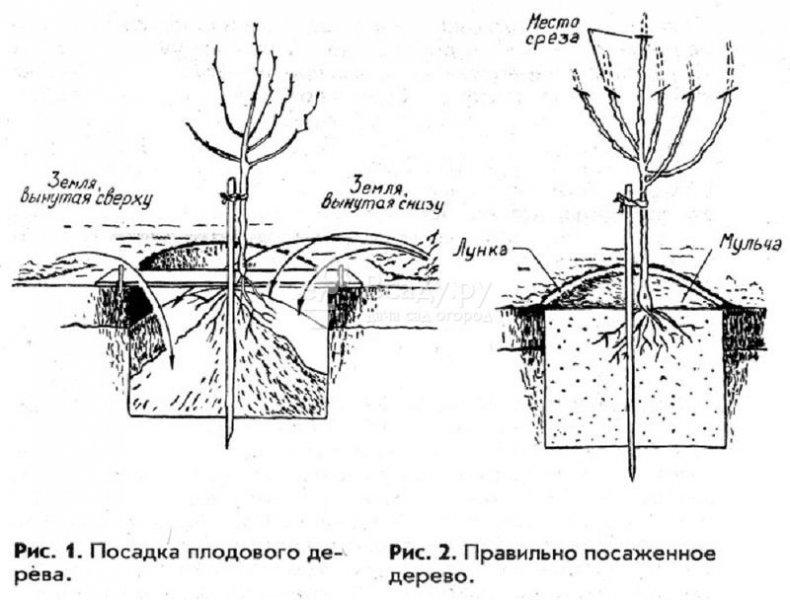
Procedure technology
The tree is planted in a sunny, dry area. For planting, a hole is dug with dimensions of 100x100 cm, a depth of 70 cm. It is better to prepare a planting hole 2 months before planting.
The pit must be filled with peat, humus, ash and phosphorus-potassium fertilizers.
The seedling is set so that the root collar remains above the ground. The hole is filled with soil, the soil is tamped a little and a groove is made around the trunk. The planted tree is watered and mulched with a 15 cm layer of sawdust or small chips.
Growing a fruitful garden
Knowledge of agricultural technology will help even a novice gardener to achieve not only an enviable harvest, but also to keep the apple trees in a healthy state.
Regularity of watering and fertilization
In the first months of life, the seedling needs more frequent watering. During the summer period, the plant is moistened at least 7 times. In subsequent years, it is enough to water the apple tree 4-5 times per season. Each tree should take 6-7 buckets of water.

In the early years, it is not necessary to feed the tree, it has enough food from the planting pit. In subsequent years, the apple tree is fed with organic and mineral fertilizers.
How to properly handle wood
Spraying with chemicals is carried out in early spring. The rest of the time, diseased fruits and leaves are harvested by hand and destroyed.
Pruning and shaping
In order for the crown not to grow and become too thick, it is necessary to prune. Damaged or weakened shoots are ruthlessly removed. Starting from the second year, the main stem of the plant is pruned. This is done to increase and develop side branches.
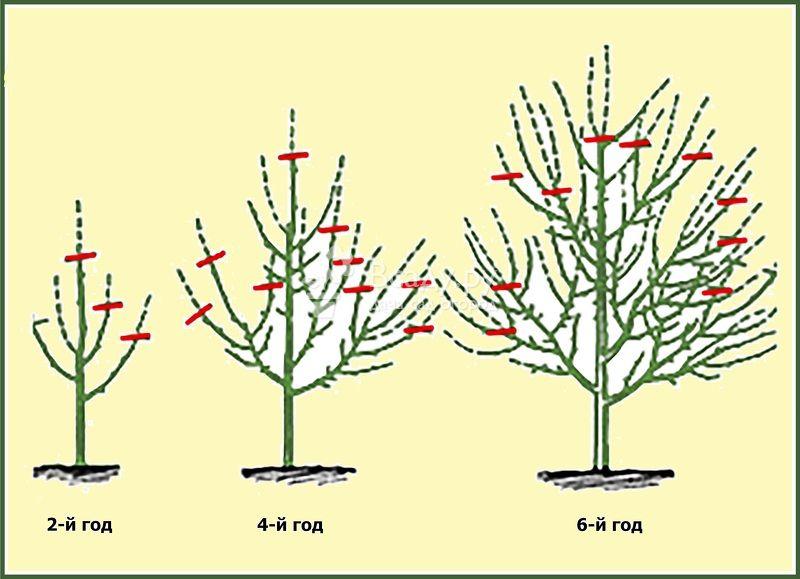
Mulching and wintering
When preparing the tree for winter, it must be sprayed to protect it from pests. Then the roots of the apple tree are insulated with peat or humus mulch.
Features of fruiting
Despite its unpretentious nature, a fruiting tree needs care.
Timing
Apple trees begin to produce their first fruits quickly. Already for 4-5 years, you can wait for the harvest.
Flowering
The Bryansk apple tree blooms in May. If the tree grows in the southern edges, the first flowers will appear in the last days of April.
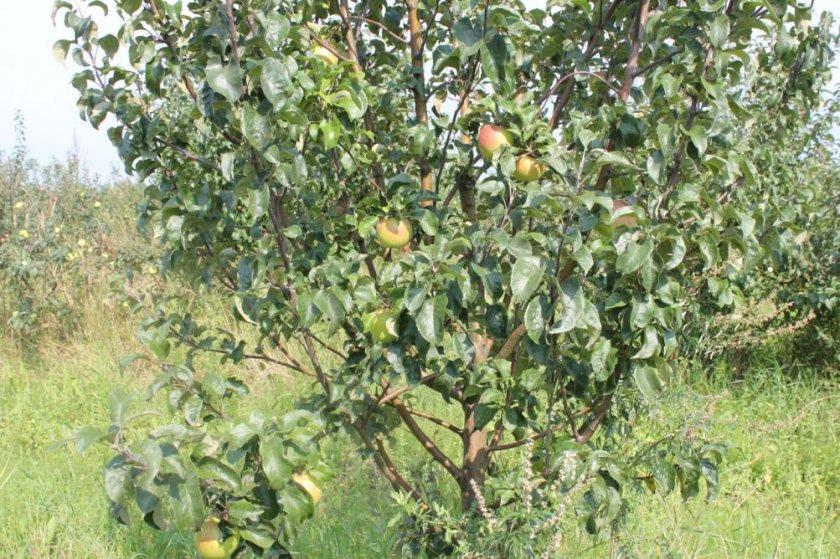
Fruit ripening
Like all representatives of the winter varieties, the Bryansk beauties yield a harvest at the end of September.
Storage duration
The guaranteed shelf life of fruits is until the last days of December. If the temperature regime is observed, apples can lie until spring.
